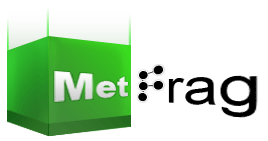MetFrag Web
Use MetFrag directly from your browser for a visual, interactive experience. Great for beginners or exploring your data
MetFrag CL
Use the MetFrag command line tool for batch processing and additional features. See detailed documentation for settings
MetFrag in R
Users familiar with R can download the MetFragR R-package, or use MetFrag built into the patRoon workflow
Converter
Tools to convert between MetFrag-related file formats, including MassBank to MetFrag and SDF to XLS
Overview
MetFrag is a freely available software to annotate metabolites and other small molecules using fragmentation information from tandem mass spectra, which is a first and critical step towards identification of a molecule's structure. Candidate molecules can be retrieved from different databases using mass or molecular formula and are then fragmented in silico and matched against the fragments. The resulting score calculated using the fragment peak matches can be used to rank the various candidate molecules. Additional scoring terms, including an experimental mass spectral library match, or database-specific scoring terms such as patent and literature values can be defined in the settings.
Availability
MetFrag can be easily used via the web interface as documented here. The MetFrag Command Line version (latest release here; documented here) is available for high-throughput data processing options. For R users, options include the MetFragR R-package and the integrated non-target screening workflow patRoon.
Citing MetFrag
Please cite this article when using MetFrag:
C Ruttkies, EL Schymanski, S Wolf, J Hollender, S Neumann (2016) MetFrag relaunched: incorporating strategies beyond in silico fragmentation Journal of Cheminformatics 8:3. DOI: 10.1186/s13321-016-0115-9
Other MetFrag Publications
Exposomics - MetFrag Meets PubChemLite: EL Schymanski, T Kondic, S Neumann, PA Thiessen, J Zhang, EE Bolton (2021) Empowering large chemical knowledge bases for exposomics: PubChemLite meets MetFrag Journal of Cheminformatics 13:19. DOI: 10.1186/s13321-021-00489-0
MetFrag with Statistical Fragment Learning: C Ruttkies, S Neumann, S Posch (2019) Improving MetFrag with statistical learning of fragment annotations: BMC Bioinformatics 20: 376. DOI: 10.1186/s12859-019-2954-7
MetFrag and HD Exchange: C Ruttkies, EL Schymanski, N Strehmel, J Hollender, S Neumann, AJ Williams, M Krauss (2019) Supporting non-target identification by adding hydrogen deuterium exchange MS/MS capabilities to MetFrag: Analytical and Bioanalytical Chemistry 411(19), 4683–4700. DOI: 10.1007/s00216-019-01885-0
MetFrag Relaunched (2016): C Ruttkies, EL Schymanski, S Wolf, J Hollender, S Neumann (2016) MetFrag relaunched: incorporating strategies beyond in silico fragmentation Journal of Cheminformatics 8:3. DOI: 10.1186/s13321-016-0115-9
Original MetFrag Version (2010): S Wolf, S Schmidt, M Müller-Hannemann, S Neumann (2010) In silico fragmentation for computer assisted identification of metabolite mass spectra: BMC Bioinformatics 11:148. DOI: 10.1186/1471-2105-11-148. Here are the papers that have cited MetFrag (version 2010) so far in PubMed and Google Scholar.
License
MetFrag is published under a GNU Lesser General Public License version 2.1 or later.




